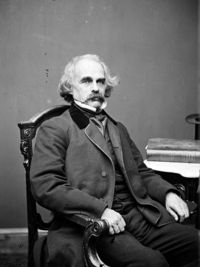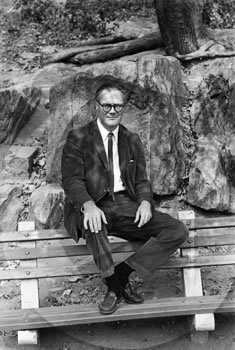Poems
For the Union Dead (1964)
Hawthorne
Follow its lazy main street lounging
from the alms house to Gallows Hill1
along a flat, unvaried surface
covered with wooden houses
aged by yellow drain
like the unhealthy hair of an old dog.
You'll walk to no purpose
in Hawthorne's Salem.
I cannot resilver the smudged plate.
I drop to Hawthorne, the customs officer2,
measuring coal and mostly trying to keep warm-
to the stunted black schooner,
the dismal South-end dock,
the wharf-piles with their fungus of ice.
On State Street
a steeple with a glowing dial-clock
measures the weary hours,
the merciless march of professional feet.
Even this shy distrustful ego
sometimes walked on top of the blazing roof,
and felt those flashes
that char the discharged cells of the brain.
Look at the faces-
Longfellow, Lowell, Holmes and Whittier3!
Study the grizzled silver of their beards.
Hawthorne's picture,
however, has a blond mustache
and golden General Custer4 scalp.
He looks like a Civil War officer.
He shines in the firelight. His hard
survivor's smile is touched with fire.
Leave him alone for a moment or two,
and you'll see him with his head
bent down, brooding, brooding,
eyes fixed on some chip,
some stone, some common plant,
the commonest thing,
as if it were the clue.
The disturbed eyes rise,
furtive, foiled, dissatisfied
from meditation on the true
and insignificant.
(For the Union Dead, 1964)
1Gallows Hill, Salem Town, was the place of execution during the Salem Witch Hysteria of 1692.
2In 1846 Hawthorne took the position of Surveyor of the Port at the Salem Custom House. After losing his job in June of 1849 because of a change in political administrations, and after his mother died not long after, Hawthorne announced his wish to leave Salem, which he called "that abominable city," saying that he now had no reason to remain.
3James Russell Lowell (22 February 1819 - 12 August 1891) was a United States Romantic poet, critic, satirist, writer, diplomat, and abolitionist. Lowell was born, lived most of his life, and died, in Cambridge, Massachusetts. He was the son of Charles Lowell (1782–1861). On his mother's side he was descended from the Spences and Trails, who made their home in the Orkney Islands. His great-grandfather, Robert Trail, had returned to Britain on the outbreak of hostilities in 1775. He was brought up near open countryside, and always felt close to nature; he also became acquainted with the work of Edmund Spenser and Sir Walter Scott in childhood, and was taught old ballads by his mother. His schoolmaster was an Englishman, and before he entered Harvard College he had a more familiar acquaintance with Latin verse than most. He graduated from Harvard University in 1838, after an undistinguished academic career. During his college course he wrote a number of trivial pieces for a college magazine, and shortly after graduating printed for private circulation the poem his class had asked him to write for their graduation festivities. Not knowing what vocation to choose, he vacillated among business, the ministry, medicine and law. Having decided to practise law, he took a course at the Harvard law school, and was admitted to the bar. While studying law, however, he contributed poems and prose articles to various magazines and was one of the five members of the group known as the "Fireside Poets".
4George Armstrong Custer (December 5, 1839-June 25, 1876) was a United States Army cavalry commander in the American Civil War and the "Indian Wars". He is remembered for his defeat and death at the Battle of the Little Bighorn against a coalition of Native American tribes led by Crazy Horse.
 |
 |